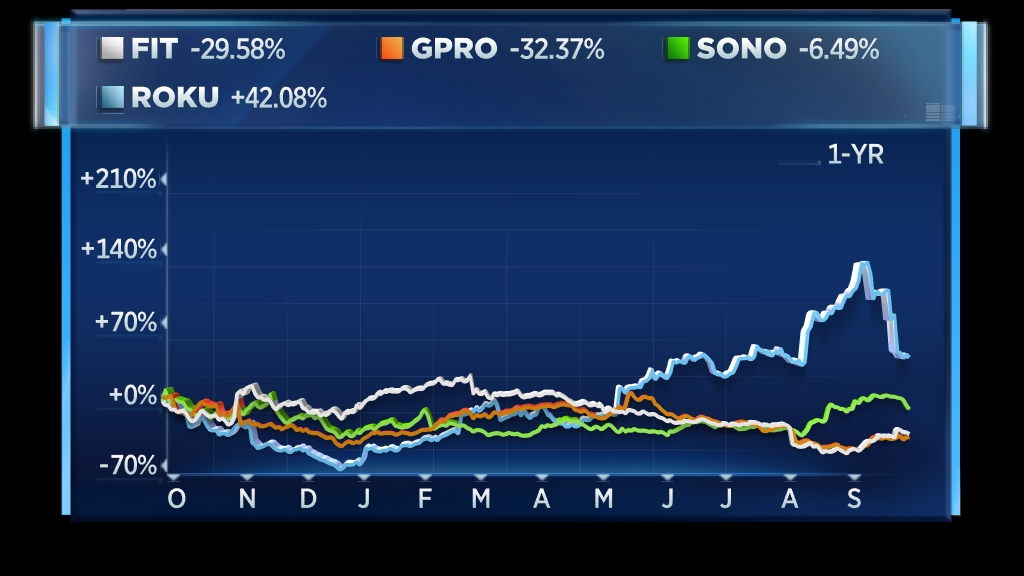Peloton hit the market on Thursday amid a wave of investor skepticism, following the disappointing debuts of Lyft and Uber earlier this year and the WeWork cataclysm of the past month.
While negative sentiment may be weighing on the stock — it fell 11% on its first day — Peloton’s business does not resemble the sharing economy companies at all. Peloton sells exercise bikes and treadmills and subscriptions that allow customers to take an assortment of live and on-demand classes.
That puts Peloton into a class of web-connected devices — another market that’s fallen out of favor with investors. But even with its lackluster opening, Peloton is trading at a multiple that’s much higher than other pure-play consumer device makers like fitness-tracking company Fitbit, action camera maker GoPro, and Sonos, which sells wireless speakers and sound systems.
Fitbit and GoPro have been disastrous public market investments — both are down about 80% from their IPO price. Sonos is down 10% from its debut last year.
At the same time, Peloton is trading at a relative discount to Roku, which also makes a consumer device. Roku is up 41% from a year ago, and up a whopping 237% this year, even after a recent 40% drop on signs of heightened competition from Apple, Comcast and Facebook.
But that’s because Roku has primarily become an advertising and software licensing company that’s no longer dependent on device sales. In this view, Roku is more of a technology platform for streaming video content than a consumer hardware company.
Peloton’s future on the market depends on which route investors take with it: Consumer hardware or fitness platform.

‘Six or seven different companies in one’
Peloton fell to $25.76 on Thursday, from its IPO price of $29. At a market capitalization of $7.2 billion, Peloton is trading at 7.9 times revenue over the last four quarters.
Fitbit and GoPro are both valued at 0.6 times sales, and Sonos at a multiple of 1.2, according to FactSet.
Roku, by contrast, trades for 12.9 times revenue, putting it more in line with high-growth software companies than newer gadget companies or legacy hardware makers like Apple (3.9), Intel (3.3) or Qualcomm (3.7).
Peloton is currently being valued squarely in the middle, which makes sense given the range of businesses where the company operates.
CEO John Foley told CNBC’s “Squawk Box” on Thursday that in addition to being a fitness brand, Peloton is squarely in retail, logistics, hardware, software, apparel and media because, like Spotify, it has to license music. Meanwhile, the company is opening stores in Germany, and spending $50 million in both London and New York to open studios for yoga, boot camps and cycling.
“I feel like we’re six or seven different companies in one,” Foley said. “It is a unique modern company that’s singularly focused on one experience of better fitness in the home, but in order to get there, we had to do a lot of things.”
Peloton does enjoy one advantage over other consumer tech companies: No obvious competition from the tech giants. The Apple Watch has taken down Fitbit, and GoPro has struggled as smartphone cameras have taken over. Sonos and Roku both compete with Amazon and Google, among others.
In its prospectus, Peloton cites competition from “in-studio fitness classes, fitness clubs, at-home fitness equipment and content, and health and wellness apps,” without naming any names. With that set of potential rivals, investors may be more inclined to value Peloton like Planet Fitness, a budget fitness chain that went public in 2015 and trades for 7.8 times revenue.
Just don’t say ‘WeWork’
Based on the fundamentals, Peloton looks a lot like other venture-backed growth companies in recent years, with fast revenue growth and even faster-growing losses.
Peloton recorded revenue of $223 million in the quarter that ended in June, up more than 100% from a year earlier. Just over 70% of sales came from “connected fitness products,” while most of the balance was from subscriptions, which run $39 a month.
Over that same stretch, Peloton’s quarterly net loss more than quadrupled to $47 million, largely because of rising research and development costs for new products and expanding facilities.
Peloton does not want to be lumped in with WeWork, which has been unable to sell its story to the public market and is now in crisis mode following the resignation this week of CEO Adam Neumann. Investors have determined that WeWork is more of an overly-ambitious real estate firm than a tech company, and Foley may not have done himself any favors when he said on Thursday that he refers to losses as investments, describing the company’s endeavors as “disciplined investing.”
WeWork’s Artie Minson said the very same thing in May, after the company reported a $264 million quarterly loss. Minson, who was elevated this week from finance chief to co-CEO, told CNBC at the time that, “We really want to emphasize the difference between losing money and investing money.”
For WeWork, anyway, investors aren’t buying it.
Disclosure: CNBC parent Comcast-NBCUniversal is also an investor in Peloton.
